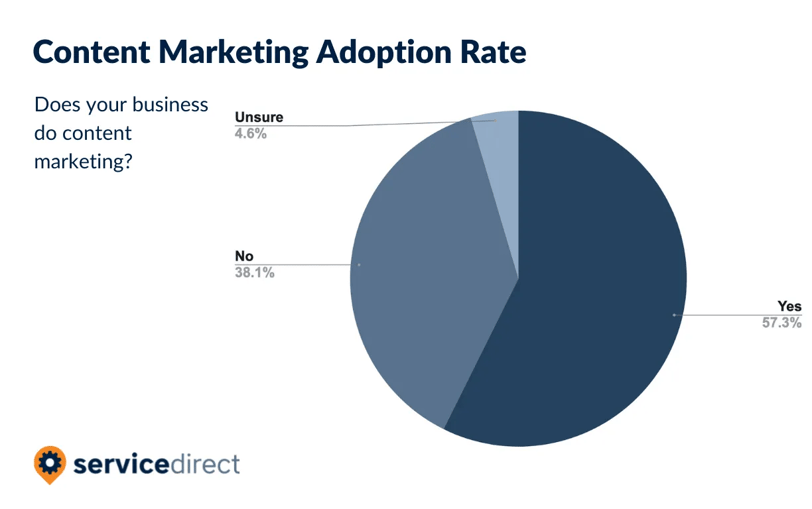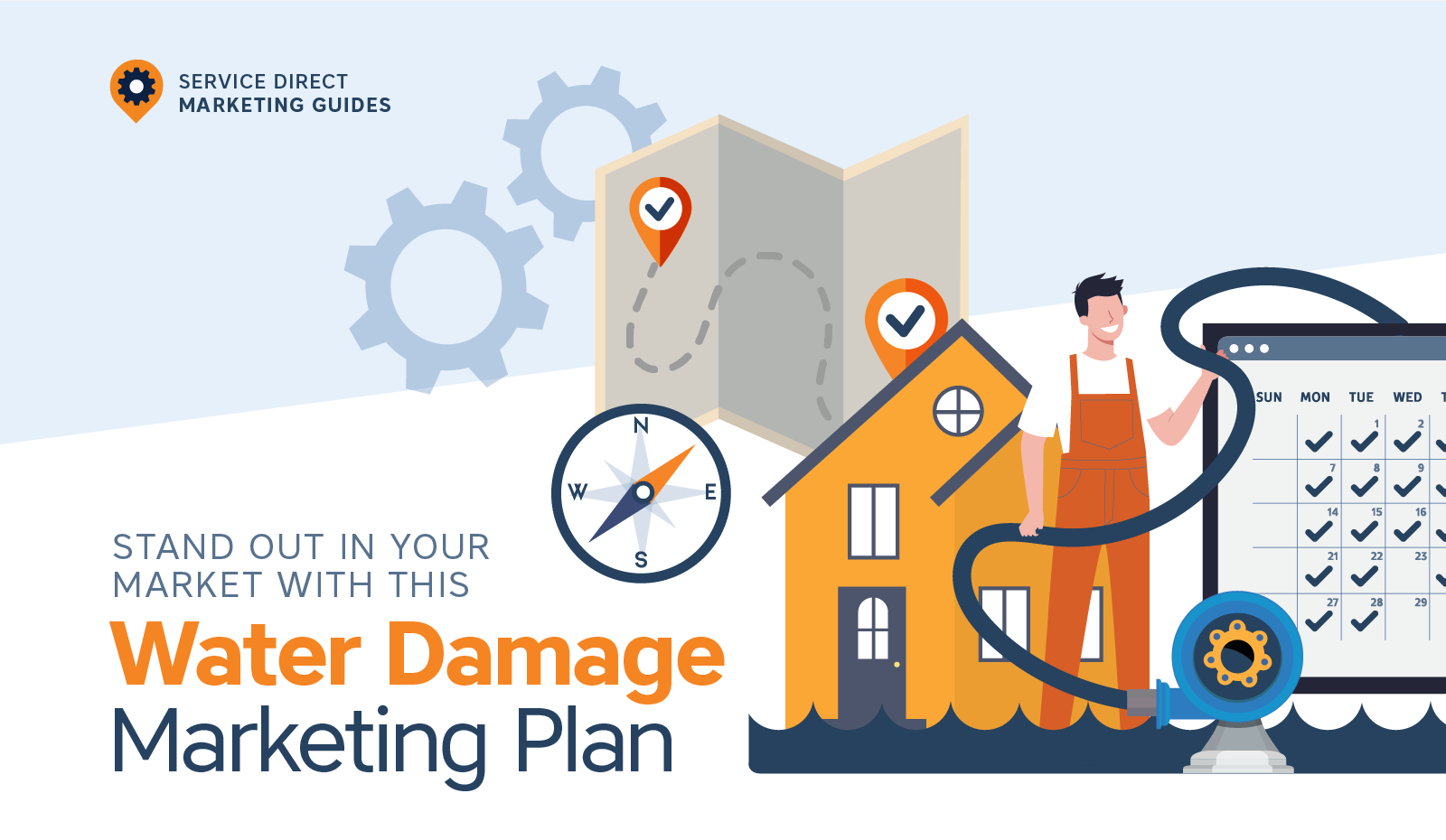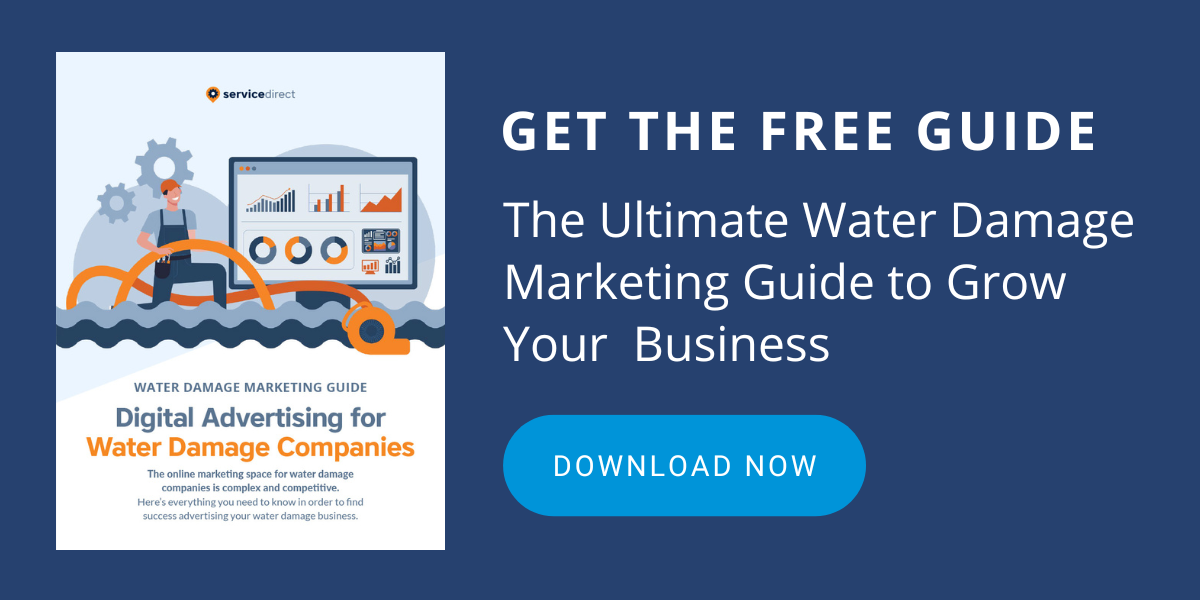How to Market Your Water Damage Services Like a Pro
A good water damage marketing plan will help you reach your target market, set and track achievable goals, and feel comfortable building on your existing plan as your company grows.
We found that only 57% of small businesses report doing any content marketing, and only 61% of those businesses have a documented content marketing plan. With a solid marketing plan in place, you’ll see growth in your business while staying ahead of the competition.

In this article, we will discuss how you can ensure your company thrives by developing a water damage marketing plan that works to get your company off the ground and moving toward your long-term goals.
Build Your Brand
Your water damage company's brand is how customers will perceive your business. A strong brand will help you connect with customers and create a lasting impression. It's important to focus on branding if you're looking to reach customers through a digital marketing plan.
Take the time to define your company's mission and values, and craft a brand identity that reflects those things. Then, be consistent in how you communicate your brand across all of your marketing channels.
How to Craft a Mission Statement
For small businesses trying to connect with new customers, it's important to have a mission statement that resonates internally with you and your team and externally with your customers.
Your mission statement should be more than just a few words on paper; it should be the guiding principle that drives everything you do. It should be something your employees can rally behind and your customers can identify with.
You can use your well-crafted mission statement in your marketing plan to help you attract the right kind of attention and build a loyal following.
Are you feeling stuck on developing your mission statement? Check out a list of memorable mission statements to get some inspiration.
Find Your Target Audience
Understanding your target audience is crucial for successful marketing. In the water damage restoration industry, your potential customers typically fall into specific demographics and psychographics.
Most of your customers will be homeowners dealing with water damage issues. They can range from young couples who just bought their first home to older adults maintaining long-owned properties.
Your target audience should also be local to your service area, often living in areas prone to water damage, such as regions with frequent storms or older homes with plumbing issues.
Psychographics are more about what your target audience is thinking and feeling. For example, your ideal customers might be worried about the safety and integrity of their homes after water damage.
They also appreciate quick, efficient responses to minimize damage and prevent further issues and they prefer professionals who are knowledgeable, experienced, and reputable in the water damage restoration field.
Customer personas are detailed profiles of your ideal customers. They help you understand who you’re marketing to and tailor your strategies accordingly. Here’s how to create effective customer personas:
-
Research: Gather data on your existing customers through surveys, interviews, and market research. Identify common traits and behaviors.
-
Profile: Develop profiles that include demographic information, such as age, income, and location, as well as psychographic details like concerns, motivations, and preferences.
-
Name and Picture: Give each persona a name and a representative image to make them more relatable.
.jpg?width=1024&height=768&name=Customer%20Persona%20Example%20(1).jpg)
For example, Homeowner Hannah is a 45-year-old mom worried about structural damage and her family's safety. She prioritizes a quick response time, clear communication, and thorough service.
Understanding the Customer's Journey
The customer journey in water damage situations typically involves several stages:
- Awareness: The customer realizes they have a water damage problem and needs professional help.
- Consideration: They start researching options, comparing different restoration services, and seeking recommendations.
- Decision: They choose a service provider based on factors like reputation, reviews, and response time.
- Service: The actual restoration work is performed. Communication and professionalism are key during this stage.
- Aftercare: Follow-up to ensure satisfaction and address any lingering issues, building long-term customer relationships.
By understanding these stages, you can tailor your marketing efforts to meet customers' needs at each point.
What is Market Positioning?
As you develop your digital marketing plan, it's important to think about how you want to position your business in the market. Who is your target audience, and what do they need?
Once you have a good understanding of your audience, you can start to figure out what makes your company unique and how you can best meet their needs.
Do you have a unique selling proposition? What do you offer that your competitors don't? Once you have a clear idea of your market positioning, you can begin to develop targeted digital marketing campaigns that will help you reach your goals.
As you continue to iron out your company's market positioning, keep these key questions in mind and you'll find a solid space for your water damage business to fit in the market:
|
SERVICE
|
PEOPLE
|
|
PRICE
|
PROCESS
|
Understand Your Competitors
In the competitive water damage restoration industry, understanding your competitors is crucial for staying ahead. Conducting a SWOT analysis and analyzing competitors' marketing strategies can provide valuable insights.
Evaluate your business's internal and external factors with a SWOT analysis:
- Strengths: Identify what your business does well (e.g., quick response times, experienced staff).
- Weaknesses: Recognize areas for improvement (e.g., limited marketing budget, lack of online presence).
- Opportunities: Look for external factors to leverage (e.g., emerging technologies, market gaps).
- Threats: Identify potential challenges (e.g., new competitors, economic downturns).
.jpg?width=1600&height=900&name=SWOT%20Analysis%20Explainer%20(1).jpg)
To understand the competitive landscape, start by identifying your key competitors in the water damage restoration industry. Use search engines to find local companies, paying attention to those that appear at the top of search results.
Once you’ve identified your key competitors, analyze their marketing strategies to gain insights into their strengths and weaknesses. Check their search engine rankings for relevant keywords using tools like SEMrush or Ahrefs to understand their SEO and backlink strategies.
Review their social media profiles to see how they engage with their audience, the types of content they post, and the level of interaction they receive. Assess their content marketing efforts, such as blog posts, videos, and infographics, to determine how they position themselves as industry experts.

Finally, read customer reviews on platforms like Google, Yelp, HomeAdvisor, and Facebook to identify common themes in feedback, such as strengths and areas for improvement. This detailed analysis will help you refine your own marketing efforts and differentiate your business.
Craft Specific Goals
If you're serious about your water damage online marketing goals, you need to be tracking your progress. Without tracking, you won't be able to see what's working and what isn't.
But it's not enough just to track your goals. You also need to set realistic goals in the first place. Otherwise, you'll end up disappointed with your results.
Fortunately, setting realistic goals is easier than it sounds. Start by figuring out what you want to achieve, and then break those goals down into smaller, more manageable pieces. The OKR goal-planning methodology is a great place to start for many small businesses. With OKRs, your goals are broken down into Objectives, Key Results, and Tasks.

Once you have the beginnings of a marketing plan in place, you can set goals and start tracking your progress to make necessary adjustments as needed. With a little forethought and a lot of consistent effort, your water restoration marketing plan will be successful.
Draw Up a Budget
When it comes to water damage digital marketing, one of the most important things you can do is set a realistic budget. Without a budget in place, it's all too easy to overspend on your marketing efforts and end up in the red. But how do you know how much to allocate for your digital marketing plan?
There are a few factors you'll need to consider, most of which we've already discussed in this blog. These include the size of your target market and the level of competition as well as which channels you want to focus on because each one will come with its own set of costs.
Once you have a clear understanding of your needs, you can start to put together a budget that will help you achieve your marketing goals.
With a well-defined budget in place, you'll be able to make the most of your marketing dollars and get the results you're looking for. So don't cut corners when it comes to developing your digital marketing plan—setting a realistic budget is crucial to success.
OPtimize Your Website
Search Engine Optimization (SEO) improves your website's visibility on search engines like Google. It involves optimizing various aspects of your water damage website to rank higher in search results, effectively driving more organic traffic to your business.

Keyword research is the foundation of effective water damage SEO. Use tools like Google Keyword Planner, SEMrush, or Ahrefs to identify relevant keywords such as "water damage [CITY]," "water remediation near me," and "water damage emergency."
Implement these keywords throughout your website, including in titles, headers, meta descriptions, and content. Ensure your keywords naturally fit into the content to avoid keyword stuffing, which can negatively impact your rankings.
Why Your Water Damage Restoration Site Needs Content
Content marketing is vital for attracting, engaging, and converting customers. High-quality content helps establish your business as an industry authority, improves SEO, and builds trust with potential clients.

Types of Content That Attract and Engage Customers:
- Blogs: Write informative blog posts on topics like preventing water damage, common repair techniques, and maintenance tips.
- Videos: Create videos showcasing your repair process, customer testimonials, and before-and-after transformations.
- Social Media: Share posts on different social channels and directly engage with customers.
Start Water Damage Digital Marketing
Pay Per Click (PPC) Advertising
PPC advertising allows you to place ads on search engines and pay only when someone clicks on them. 87% of small businesses report that it is an effective way to drive immediate traffic to your website.

Water damage PPC ads appear at the top of search results, making them highly visible to potential customers. Use keyword research tools to identify high-intent keywords related to water damage repair and target them in your campaigns.
Track metrics like click-through rate, conversion rate, and cost per click to measure your campaign’s effectiveness. Adjust your bids, ad copy, and targeting to improve performance.
Content Marketing
Content marketing involves creating and distributing valuable content to attract and engage your target audience.
Plan your content in advance by creating a calendar that outlines topics, formats, and publishing dates. Share positive testimonials and reviews to build trust and credibility with potential customers.
Local SEO
Local SEO focuses on optimizing your online presence to attract local customers. Optimize your Google Business Profile, use local keywords, and ensure NAP consistency across all online platforms.
Email Marketing
Water damage email marketing helps you stay in touch with past customers and nurture leads. Keep these tips in mind:
- Building an Email List: Collect email addresses through your website, social media, and in-person interactions.
- Crafting Effective Email Campaigns: Send newsletters, promotions, and useful tips to your subscribers.
- Personalization and Automation: Use email personalization to address specific customer needs and automate your email campaigns to save time and increase efficiency.
Should I Hire a Content Marketing Agency?
Hiring a marketing agency can be beneficial if you lack the time or expertise to manage your marketing efforts. An agency can provide:
- Expertise: Professional marketers with experience in creating and executing effective content strategies.
- Time Savings: Free up your time to focus on running your business while the agency handles your marketing.
- Consistent Results: Agencies can provide consistent, high-quality content that helps you achieve your marketing goals.
Consider your budget and marketing needs when deciding whether to hire an agency. If you choose to hire one, ensure they have experience in the water damage restoration industry and a proven track record of success.
In Conclusion
Growing your water damage restoration business through online marketing is essential in today's digital age.
Whether you manage your marketing in-house or hire a content marketing agency, the key is to remain proactive and adaptive to the ever-changing digital landscape. Start implementing these strategies today to see your business thrive.
Author's Note: This post was originally published in March 2023 and has been updated to reflect current market trends and data.
FAQs about marketing water damage restoration services
What Are the Key Components of Building a Strong Brand?
Building a strong brand involves several key components, including developing a unique logo and tagline, establishing consistent branding across all marketing materials, creating a compelling mission statement, and ensuring a strong online presence through a professional website and active social media accounts.
How Do I Identify My Target Audience for Water Damage Repair Services?
Identifying your target audience involves understanding the demographics and psychographics of potential customers. This includes factors like age, income, location, and lifestyle. Creating detailed customer personas and mapping out the customer journey can also help effectively target the right audience.
What is Market Positioning, and Why is it Important?
Market positioning refers to the process of establishing your service in a specific niche within the market to differentiate it from competitors. It is important because it helps potential customers understand what makes your water damage repair services unique and why they should choose you over others.
Why is a SWOT Analysis Important in Understanding Competitors?
A SWOT analysis helps identify your business’s Strengths, Weaknesses, Opportunities, and Threats in relation to your competitors. This analysis provides insights into areas where you can improve, opportunities you can leverage, and potential threats you need to address to stay competitive.
How Can SEO Help Optimize My Water Damage Restoration Website?
SEO (Search Engine Optimization) helps improve your website’s visibility on search engines. By targeting relevant keywords, optimizing on-page elements like title tags and meta descriptions, and building high-quality backlinks, you can attract more organic traffic to your website and increase your chances of converting visitors into customers.
What Types of Content Should I Include on My Water Damage Repair Site?
Your website should include a variety of content that attracts and engages visitors. This can include informative blog posts, detailed service pages, customer testimonials, case studies, and engaging videos. Content marketing helps establish your authority in the industry and build trust with potential customers.
How Effective is PPC Advertising for Water Damage Repair Services?
PPC (Pay-Per-Click) advertising is highly effective for water damage repair services, allowing you to target specific keywords related to your business. With PPC, you can reach potential customers who are actively searching for water damage restoration services, driving targeted traffic to your website and increasing your chances of generating leads.
Should I Hire a Content Marketing Agency for My Water Damage Business?
Hiring a content marketing agency can be beneficial if you lack the time or expertise to consistently create high-quality content. An agency can help develop a content strategy, produce engaging content, and manage your content marketing efforts, allowing you to focus on running your business while still benefiting from effective marketing.




